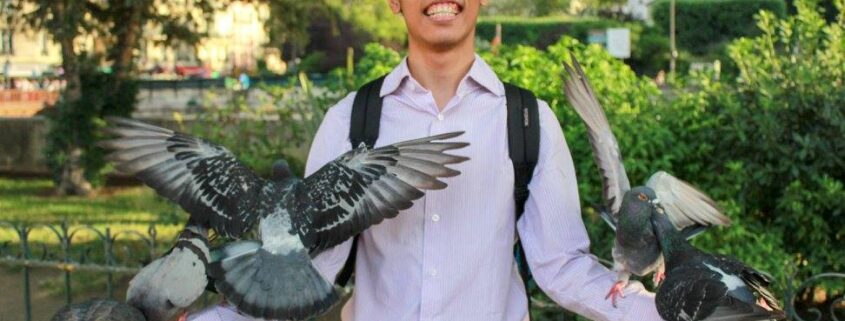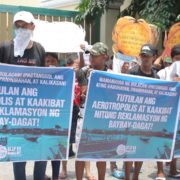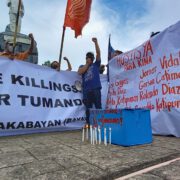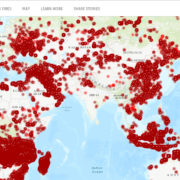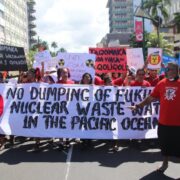Slain Lumad teacher leads 2022 Gawad Bayani ng Kalikasan awardees
Chad Booc was honored for his unwavering defense of the Lumad rights to their ancestral land and to their environment
A slain Lumad school volunteer teacher led the list of winners in the 2022 Gawad Bayani ng Kalikasan Awards given by the group Center for Environmental Concerns (CEC) last Wednesday, December 28.
Chad Errol Booc, killed along with four others by the Philippine military last February 24, was named most distinguished awardee in the seventh edition of the awards.
CEC said Booc was chosen for his unwavering defense of the Lumad rights to their ancestral [land] and to their environment.
Booc also contributed substantially to the creation of viable and sustainable models of education and food production of the indigenous peoples’ groups he served, the group said.
Despite being threatened, red-tagged and ceaselessly harassed, Booc persisted in his work, helping create a map of mining tenements in the Lumad territories using data from the Department of Environment and Natural Resources, information from indigenous peoples and his own research in the Surigao provinces in Mindanao.
The military said Booc and his companions were New People’s Army (NPA) rebels who died in a 15-minute firefight in New Bataan, Davao de Oro.
Booc’s organization Save Our Schools Network however said the casualties were massacred, victims of the Armed Forces of the Philippines’ usual canard of reporting armed encounters with rebel groups when it has killed civilians or NPA hors de combat.
READ: ‘Chad Booc and 4 others were massacred’ – Save Our Schools Network
A cum laude Computer Science graduate of the University of the Philippines, Booc dedicated his life to becoming a volunteer teacher for Lumad students, later becoming the most ardent campaigner for the indigenous peoples’ right to education when the Manila government has started closing their schools down as part of its counter-insurgency campaign.
Dangerous country for environmental defenders
Quoting a 2019 Institute for Economics and Peace report, the CEC said the Philippines has become the country most at risk from the climate crisis made worse by destructive projects.
The threat of biodiversity loss, deforestation and unsustainable development path also comes with the killing of at least 300 environmental defenders in the last decade, the group said.
The CEC said that Filipino environmental defenders persist
in their outsized role in protecting the environment, successfully halting at least 11 % of environmentally-destructive projects.
“Still, their role is often overlooked by governments and international organizations when they discuss potential solutions to the climate and ecological crisis,” CEC bewailed.
“[I]t was only in 2019 that the United Nations formally recognized their role in environmental protection,” it added.
The CEC said its biennial Gawad Bayani ng Kalikasan (Hero of the Environment Award) seeks to highlight and reinforce the efforts of environmental defenders who are ordinary people, grassroots organizations as well as communities.
Distinguished list of awardees
Aside from Booc, the 7th staging of the awards included three other individual and three organizational awardees.
Dr. Kelvin Rodolfo, advocate of the role of Filipino scientists in creating evidence-based government policies on environmentally-critical projects, is one of the Gawad sa Indibidwal (Award to Individual) recipients.
Using well-researched arguments, Dr. Rodolfo has opposed the operation of the controversial Bataan Nuclear Power Plant, the Manila Bay reclamation projects and the Laguna Lake Expressway Dike project.
Daniel Jason Maches is the second Gawad sa Indibidwal awardee, recognized for his defense of Barlig, Mountain Province’s forest as well as his campaign to preserve his Lias tribe’s culture.
His active opposition to the suspension of a road project that would have opened up the Barlig forests to reckless exploitation exposed him to attacks and red-tagging, the CEC said.
Aside from defending the environment and their culture, Maches has also successfully started an environmentally-sustainable agro-ecology coffee farm that is naturally integrated with the forest, the group added.
Controversial 69-year old campaigner Vertidez “Daisy” Macapanpan is the third individual honoree who made headlines after being violently and illegally arrested by at least 40 police officers, including members of an elite unit last June.
Lovingly called “Mother Nature” by the people of her hometown Pakil, Laguna, Macapanpan leads the campaign against the proposed 1400 megawatt Ahunan Pumped-Storage Hydropower Plant Project.
Opponents of the project said the project threatens the fragile ecosystem in the area as well as the people’s way of life that is dependent on the water supply provided by the nearby mountain range.
A group of fisher folk is this year’s first Gawad sa Organisasyon (Award to Organization) honoree opposed to the New Manila International Airport construction that has destroyed fishing grounds and mangrove forests in Bulacan province.
The Samahan ng Mangingisda at Mamamayan sa Latian ng Bulacan campaigns against the massive land reclamation connected with the new airport project, saying it has displace more than 700 fishing and urban poor families in the area.
The group also said the construction project may lead to an immeasurable destruction of marine and aquatic resources of Manila Bay.
The Masungi Georeserve Foundation is this year’s second organizational awardee, capturing the spotlight for leading the reforestation and defense of the watershed in Rizal province for years.
Foundation trustees Ann and Billie Dumaliang and co-workers have also been victims of threats from the perpetrators of illegal logging, land grabbing and large-scale quarrying in the area.
The last awardee in this year’s Gawad Bayani ng Kalikasan is the organization called the Tumandok nga Mangunguma nga Nagapangapin kay Kabuhi based in the mountainous areas of Panay Island in the Visayas.
Made up of indigenous people called the Tumandok, it opposes encroachments that pose dangers to the fragile ecosystem in their ancestral domain that sprawls over two protected areas: the Jalaur River and Pan-ay River watershed forest reserves.
The group has led the Tumandok people’s resistance to the Jalaur River Multipurpose Project that threatens to inundate their land, destroy local habitats, deprive ecosystems of nutrients, release greenhouse gasses, increase wastewater and may even trigger seismicity, the CEC said. # (Raymund B. Villanueva)

